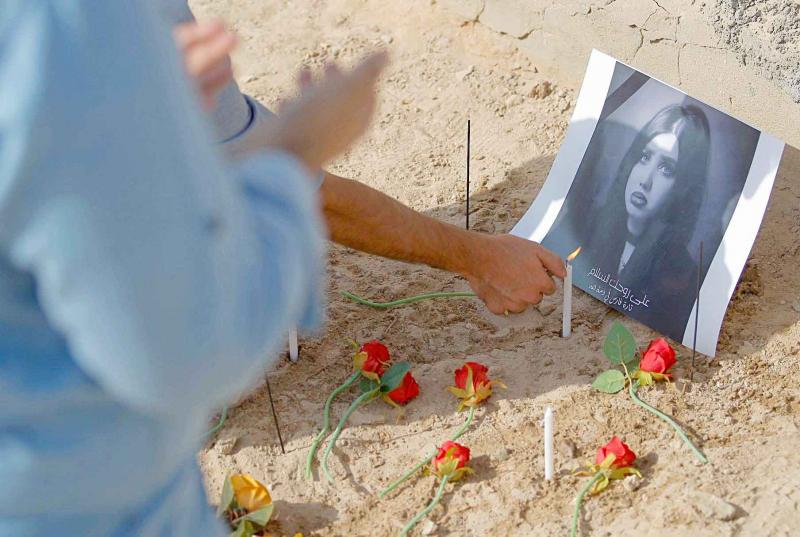Shimaa Qassem, a former Miss Iraq, started to receive death threats days after the drive-by killing in Baghdad of a social media star who had been a runner-up in that same beauty pageant.
The killing of 22-year-old Tara al-Fares followed the gunning down in September of a women’s rights activist in Basra. That killing followed the unexplained death in August of two women involved with the beauty business in Baghdad.
Qassem subsequently said prominent Iraqi women “are being slaughtered like chickens” and Prime Minister Haider al-Abadi acknowledged the pattern of killings suggests “a plan.”
What sort of plan might that be and why would it involve women’s deaths? The rest of Abadi’s sentence offers a clue. The plan, he said, was “formulated by organised parties to undermine security under the pretext of fighting against depravity.”
There we have it. Fares, a divorced, single mother, known for her brightly painted lips and short skirts on various social media platforms, was shot dead by two motorcyclists on the street for alleged “depravity.”
Rafeef al-Yassiri, who ran Baghdad’s Barbie Clinic and encouraged women to alter their appearance to fulfil their dreams, may have mysteriously died in her home because she too represented the descent to “depravity.”
Ditto, Rasha al-Hassan, the beautician who ran Baghdad’s Viola Beauty Centre and died a week after Yassiri.
Suad al-Ali, the 46-year-old Basra activist and mother of four, seems a less obvious target until one considers her crime: She made herself visible by speaking up.
Ali campaigned for human rights as well as for greater autonomy for Basra. In the weeks before she was shot at point-blank range, Ali had been protesting the lack of basic services such as safe drinking water in the city. An estimated 100,000 residents have fallen sick after drinking contaminated water.
Ali met the US consul-general in Basra, which may have drawn the attention of pro-Iranian militias. Some of the militias accuse those protesting failing government services of colluding with the United States against Iranian influence in southern Iraq.
Whatever it was, Ali was conspicuous as an outspoken woman. Those who dispatched her killers probably knew the message it would send. Women must remain unheard and unseen.
Is visibility a symptom of “depravity”? Does outspokenness signify “depravity”? Fares, for instance, had complained online about a Shia cleric’s proposal of “temporary marriage,” which suggested she was willing to call out lascivious men. Does encouraging women to use Botox constitute “depravity”? Was it depraved for Yassiri to make herself up like a Barbie doll?
Should Yassiri have gladly declared to the international media in 2015 that the Islamic State attacks “didn’t have an impact” on her beauty clinic “and thank God that people have this spirit to go on with their lives”? Was Hassan enabling decadence with the tweezers, lip liner, kohl pencil and nail polish? Did Ali in Basra encourage behaviour unbecoming of the Iraqi sisterhood?
In 2008, academics Nadje al-Ali and Nicola Pratt described the trajectory of women’s organising and the conflict in Iraq since 2003 in a paper published in “Feminist Review.” They noted that “women’s participation in the public sphere is seen by some Islamists to symbolise Western cultural encroachment of Iraq, as well as being associated with the perceived secular nature of Saddam Hussein’s regime.”
They added, women activists’ risk of being a “victim of violence and/or intimidation becomes higher as their involvement in public life challenges the views of Islamist militia and insurgent groups with regard to appropriate gender relations and gender roles.” Foreign occupation, Ali and Pratt wrote, “has helped to create an intensification of conservative gender ideologies, which are promoted not only by armed Islamist groups but also political parties in government.”
Indeed, Iraqi women’s organisations have constantly campaigned against successive attempts to replace the country’s relatively progressive personal status law governing marriage, divorce and child custody with more conservative legislation and they have argued loudly for a women’s quota in government.
Regional developments have affected women’s behaviour, expectations and the way they are perceived. Groups such as the Coalition of Arab Women MPs Combating Violence Against Women, Karama and the Arab Women Parliamentarians Forum have increased cooperation between women activists and legislators. This has allowed them to coordinate strategy, say, against draconian marry-your-rapist laws.
As Hala Ahed, a legal consultant at the Jordan Women’s Union, pointed out last year in a reference to those laws: “We started saying, ‘Why can’t we end Article 308 in Jordan, (the marry-your-rapist law) when Egypt has done it in 1999, Morocco in 2014, Tunisia in 2017 and there are motions happening in Lebanon and Iraq?”
This is the context in which to view the supposed “depravity” that led to the death of four women in Iraq.


